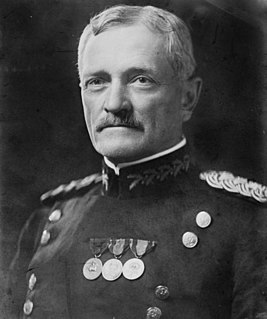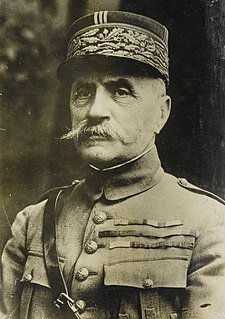A Quote by John J. Pershing
In each succeeding war there is a tendency to proclaim as something new the principles under which it is conducted. Not only those who have never studied or experienced the realities of war, but also professional soldiers frequently fall into the error. But the principles of warfare as I learned them at West Point remain unchanged.
Related Quotes
Long intervals frequently elapse between the discovery of new principles in science and their practical application... Those intellectual qualifications, which give birth to new principles or to new methods, are of quite a different order from those which are necessary for their practical application.
A large body of people, sufficient to make a nation, have come to the conclusion that they will have a government of a certain form. Who denies them the right? Standing with the principles of '76 behind us, who can deny them the right? ... I maintain on the principles of '76 that Abraham Lincoln has no right to a soldier in Fort Sumter. ... You can never make such a war popular. ... The North never will endorse such a war.
For a long time, it was believed that war was waged by armies which could not be identified with the nation itself. Professional soldiers took upon themselves the job of defending national interests, and it was understood that the war affected only them; the country itself went on living and working.
In accordance to the principles of doublethink, it does not matter if the war is not real, or when it is, that victory is not possible. The war is not meant to be won. It is meant to be continuous. The essential act of modern warfare is the destruction of the produce of human labour. A hierarchical society is only possible on the basis of poverty and ignorance. In principle, the war effort is always planned to keep society on the brink of starvation. The war is waged by the ruling group against its own subjects, and its object is not victory over Eurasia or Eastasia, but to keep the very structure of society intact.
It's important to remember that World War II was experienced very much as a continuity in that sense. Most of World War II in most of Europe wasn't a war; it was an occupation. The war was at the beginning and the end, except in Germany and the Soviet Union, and even there really only at the end. So the rest of time it's an occupation, which in some ways was experienced as an extension of the interwar period. World War II was simply an extreme form, in a whole new key, of the disruption of normal life that began in 1914.
The great error of nearly all studies of war, an error into which all socialists have fallen, has been to consider war as an episode in foreign politics when it is especially an act of internal politics and the most atrocious act of all . . . Since the directing apparatus has no other way of fighting the enemy than by sending its own soldiers, under compulsion, to their death-the war of one state against another state resolves itself into a war of the state and the military apparatus against its own people.
All the same, the fundamental truths which govern that art are still unchangeable; just as the principles of mechanics must always govern architecture, whether the building be made of wood, stone, iron or concrete; just as the principles of harmony govern music of whatever kind. It is still necessary, then, to establish the principles of war.
Unless we realize that the essence of Nazism is also an attempt to solve a universal problem of Western civilization - that of the industrial society - and that the basic principles on which the Nazis base this attempt are also in no way confined to Germany, we do not know what we fight for or what we fight against... The war is being fought for the structure of industrial society - its basic principles, its purposes, and its institutions.
In the military we also learn principles of war which also work in a corporate setting: How do you concentrate as much of your force as possible on a critical point and take a risk elsewhere? In business that translates into focusing your investment on marketing, sales, or R&D, whichever will give you the greatest return.





































